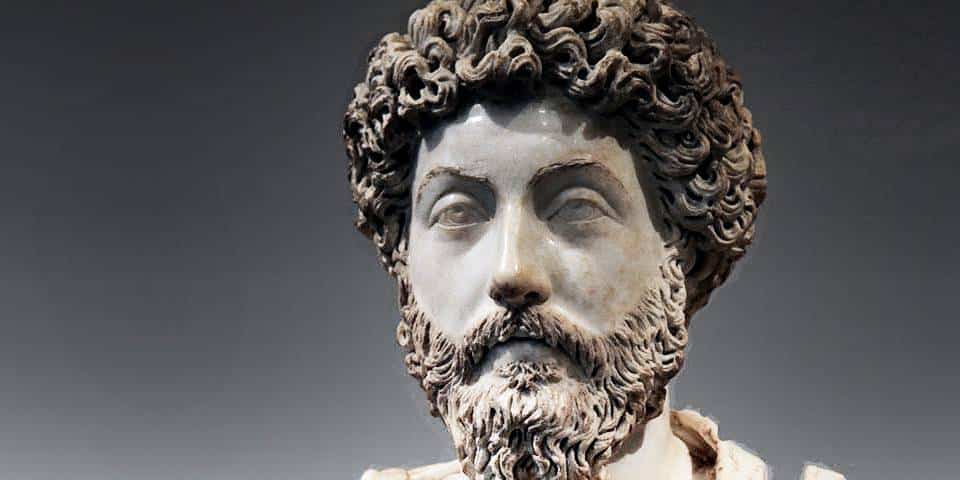

25012 views

Marcus Aurelius, or Marcus Aurelius Antonius Augustus, called the Philosopher, was a Roman emperor from 161 to 180 AD. He was the leader of the ancient Roman Empire and his adoptive brother Lucius Verus until the death of Lucius in 169 AD. Thus, he was the fifth of the Five Good Emperors. Moreover, Marcus Aurelius was the last emperor of the Pax Romana, an age of peace and stability for the Empire.
Contents
ToggleMarcus Aurelius was born into a Roman patrician family. His father was a praetor; he died in 124 AD. After his death, Marcus was raised by his paternal grandfather and mother. Also, he received education at home, which was famous for children from Roman aristocratic families. Among his tutors were the artist Diognetus, who influenced his passion for philosophy, and Tuticius Proclus.
Marcus Aurelius was betrothed to the daughter of Lucius Aelius and his relative Emperor Hadrian‘s adopted son and heir. Aelius died in 138 AD, and Hadrian chose as his new heir Antonius Pius, the husband of Marcus’ aunt. He wanted Antonius to adopt Marcus and the son of Aelius, Lucius Commodus. As an imperial heir, Marcus studied Greek and Latin. His tutors included Herodes Atticus and Marcus Cornelius Fronto. Marcus learned the notion of Stoicism by Quintus Junius Rusticus; he was made a quaestor and the symbolic head of the Roman equities.
In 140 AD, Marcus and Antonius were appointed consuls.
Later, in 145 AD, Marcus married Antonius’ daughter Faustina the Younger. In 147 AD, Faustina gave birth to a girl named Domitia Faustina. The daughter was the first of at least 13 children Faustina would give birth to in the next two decades. The next day after Domitia’s birth, Antonius gave Marcus the tribunician power and the imperium, which meant the leadership over the armies and provinces of the emperor. The first mentions of the daughter of Marcus Aurelius are known from his letters, where he described her as a sick child. Domitia died in 151 AD.
Lucius’ career was started in the role of a quaestor in 153 AD. He was a consul in 154, and with Marcus, he became consul again in 161. Lucius was known as the “son of Augustus.” As Antonius became older, Marcus started to take more care of administrative duties. When Marcus and Lucius were joint consuls, Antonius may have already been ill. Before his death, he had a fever and decided to call on the imperial council and pass the state and his daughter to Marcus. His death marked the longest reign since Augustus, surpassing Tiberius by a couple of months.
After the death of Antonius in 161, the Senate wanted to make Aurelius the only emperor, but he refused the honor unless Lucius Verus was chosen as co-emperor with Marcus. Aurelius and Verus began their reign by creating new programs related to helping the poor and gratifying the military with more pay and honors. Rulers highly appreciated free speech, the arts, and education and developed the economic plight by debasing the currency.
The two emperors were popular with the people.
Marcus Aurelius followed Stoic principles in his rule, while Verus organized lavish parties and spent money on expensive gifts for friends. In 161 AD, the Parthian king Vologases IV invaded Armenia, which was under the protection of Rome, which led to the revolt of Syria. Verus’ military experience was more substantial than Aurelius,’ and he took responsibility for the campaigns in the east. The Parthian Wars took place until 166 when Rome got the victory. While Verus was away for military purposes, Aurelius remained in Rome. The emperor adjudicated court cases, changed laws, and dealt with provinces’ issues. Also, during that period, Marcus Aurelius persecuted the new sect of Christianity, which refused to honor the state religion.
By 166 AD, there were no more problems with the Christians, and the war in Parthia ended successfully for Rome. Aurelius married Faustina in 145 and later years were significant for them for their impressive number of children. Unfortunately, some died young, but Marcus Aurelius believed that the gods could be smiling upon him with good fortune.
Verus died in 169 AD. Most probably, the reason was the plague that his troops brought back to Rome from the campaign. Thus, Marcus Aurelius was ruling alone. For most of the remaining time of his reign, he spent in Germania to campaigns, and he wrote his famous “Meditations.”
The book “Meditations” by Marcus Aurelius is the emperor and Philosopher’s principal work. The author and the Stoic school of philosophy, of which he was a devoted follower, valued reason and a logical perception of the world over all else. So, they considered a calm and analytical mind better than one ruled by desires and feelings.
The system of logos by Aurelius means that everything that happens was supposed to and is therefore good
Moreover, according to Aurelius, the only thing people can do is accept pain and move on without complaining. Here, complaining simply disrespects the immortal logic of logos embedded in every person and inflicts further pain on oneself. The author coped with the pain that caused all this suffering by maintaining his belief that physical pain is still a part of logos’ greater good.
The book’s main idea is that you are the only person who can decide your fate and actions. So even if someone doesn’t like you, don’t let yourself stoop to their level. Instead, always treat people with dignity and justice, and you will never suffer due to your actions.
Talking about the last years of the emperor, from 170 to 175, Faustina accompanied Marcus Aurelius on campaigns and went with him to Syria, Egypt, and Greece. She died in the winter of 175 AD. In 178 AD, Aurelius defeated the Germanic tribes on the Danube and died two years later in 180 AD. Commodus succeeded Marcus Aurelius.
Author: Kate Zusmann
This website uses cookies. For more info read the cookies policy
Rome.us © 2026. Created with love by Roman experts and guides.